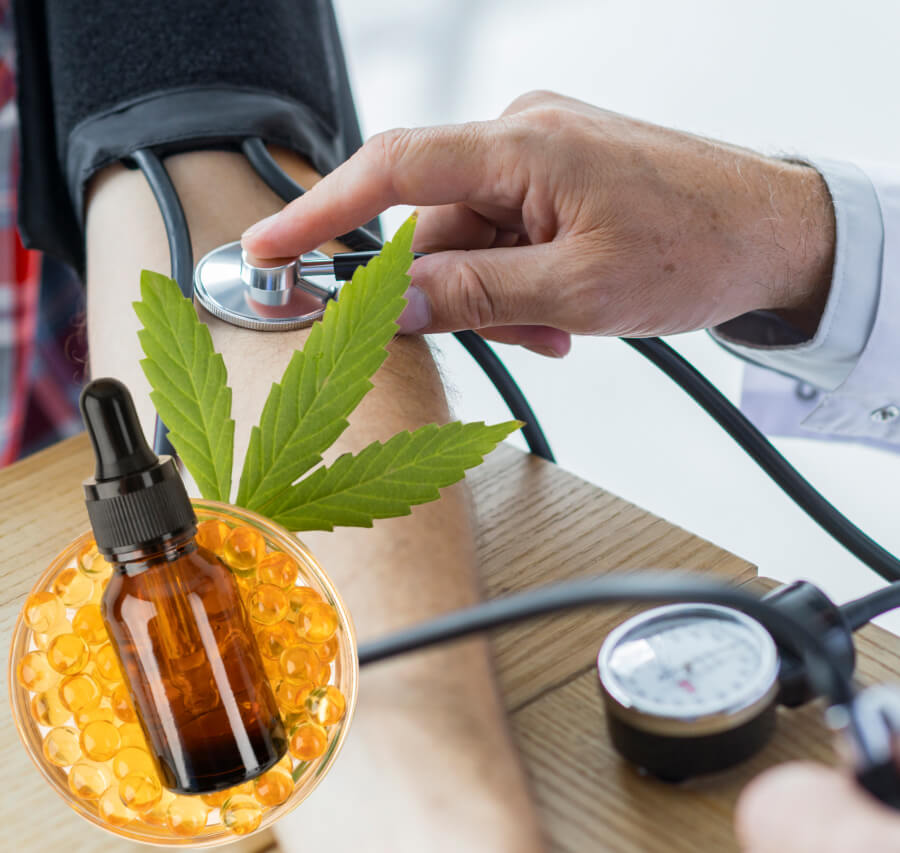Blood pressure is the force of blood pushing against the walls of your arteries as your heart pumps blood throughout your body.
When your blood pressure is too high, it can damage your arteries and increase your risk of heart disease, stroke, and other serious health problems.
High blood pressure, or hypertension, affects about one in three adults in the United States.
There are many factors that can contribute to high blood pressure, such as genetics, age, diet, stress, smoking, alcohol, obesity, and certain medications.
While some of these factors are beyond your control, others can be modified by making lifestyle changes.
Such as:
- Eating a healthy diet
- Exercising regularly
- Quitting smoking
- Limiting alcohol
- Managing stress
However, for some people, lifestyle changes may not be enough to lower their blood pressure to a healthy level.
In that case, they may need to take medications to lower their blood pressure and prevent complications.
However, some of these medications may have side effects, such as dizziness, fatigue, headache, or erectile dysfunction.
If you are looking for a natural alternative to lower your blood pressure, you may have heard of cannabidiol (CBD), a compound derived from the cannabis plant.
CBD for blood pressure is one of the many cannabinoids found in cannabis, but unlike tetrahydrocannabinol (THC), the main psychoactive component of cannabis.
CBD does not cause a “high” or impair your cognitive functions. Instead.
CBD has been shown to have various health benefits, such as reducing pain, inflammation, anxiety, and seizures.
But can CBD also lower your blood pressure and improve your heart health? In this blog post, we will explore the potential benefits, risks.
Facts of CBD for blood pressure, based on the current scientific evidence.
How CBD works in the body
CBD for blood pressure works by interacting with the endocannabinoid system (ECS), a complex network of receptors, enzymes.
Molecules that regulate various physiological processes in the body.
Such as: Mood, memory, appetite, pain, inflammation, and immune function.
The ECS consists of two main types of receptors: CB1 and CB2.
CB1 receptors are mainly found in the brain and nervous system, while CB2 receptors are mainly found in the immune system and peripheral tissues.
CBD does not directly bind to these receptors, but rather modulates their activity and influences the levels of endocannabinoids, which are the natural cannabinoids produced by the body.
By influencing the ECS, CBD may affect various factors that are related to blood pressure, such as:
Stress and anxiety:
CBD may have anti-anxiety and anti-stress effects, by reducing the activity of the amygdala, a part of the brain that is involved in fear and emotional responses.
CBD may also increase the levels of serotonin, a neurotransmitter that regulates mood, happiness, and well-being.
By reducing stress and anxiety, CBD may lower the production of cortisol, a hormone that increases blood pressure and heart rate in response to stress.
Inflammation and oxidative stress:
CBD may have anti-inflammatory and antioxidant effects, by reducing the production of pro-inflammatory cytokines, which are molecules that trigger inflammation.
By increasing the levels of glutathione, a molecule that protects the cells from oxidative damage.
CBD may also activate the nuclear factor erythroid 2-related factor 2 (Nrf2) pathway, a mechanism that regulates the expression of antioxidant genes.
By reducing inflammation and oxidative stress, CBD may protect the blood vessels from damage and improve their function.
Vasodilation and vasoconstriction:
CBD may have vasodilatory and vasoconstrictive effects, by influencing the activity of various receptors and channels that regulate the tone and diameter of the blood vessels.
For example, CBD may activate the transient receptor potential vanilloid 1 (TRPV1) channel, which causes vasodilation and lowers blood pressure.
CBD may also inhibit the angiotensin II type 1 (AT1) receptor, which causes vasoconstriction and increases blood pressure.
What the Research says about CBD For Blood Pressure
The research on CBD for blood pressure is still limited and inconclusive.
Most of the studies are preclinical, involving animal models or cell cultures, or small-scale, involving human volunteers.
However, some of the existing studies suggest that CBD may have some beneficial effects on blood pressure and heart health, such as:
Lowering blood pressure in healthy volunteers:
A randomized, placebo-controlled, double-blind, crossover study published in 2017 involved nine healthy male volunteers who received either 600 milligrams (mg) of CBD or a placebo on separate occasions.
The researchers measured their CBD for blood pressure, heart rate, and cardiac output at rest and after a stress test.
They found that CBD lowered the resting systolic blood pressure and the blood pressure increase due to stress, compared to placebo.
They also found that CBD increased the stroke volume, which is the amount of blood pumped by the heart per beat, without affecting the heart rate.
They concluded that CBD may have cardiovascular protective effects in healthy individuals.
Reducing blood pressure and inflammation in hypertensive rats:
A preclinical study published in 2019 involved hypertensive rats that received either 10 mg/kg of CBD or a vehicle for 14 days.
The researchers measured their blood pressure, heart rate, and inflammation markers at baseline and after the treatment.
They found that CBD reduced the blood pressure and heart rate of the hypertensive rats, compared to the vehicle group.
They also found that CBD reduced the levels of interleukin-6 (IL-6) and tumor necrosis factor-alpha (TNF-alpha).
Which are pro-inflammatory cytokines, and increased the levels of interleukin-10 (IL-10), which is an anti-inflammatory cytokine, in the hypertensive rats.
They concluded that CBD may have antihypertensive and anti-inflammatory effects in hypertensive rats.
Improving endothelial function and vascular stiffness in type 2 diabetic patients:
A randomized, placebo-controlled, double-blind, parallel-group study published in 2020 involved 26 type 2 diabetic patients who received either 200 mg of CBD or a placebo once a day for 13 weeks.
The researchers measured their endothelial function, which is the ability of the blood vessels to dilate and constrict, and their vascular stiffness.
Which is the rigidity of the blood vessels, at baseline and after the treatment.
They found that CBD improved the endothelial function and reduced the vascular stiffness of the diabetic patients, compared to placebo.
They concluded that CBD may have beneficial effects on the vascular health of type 2 diabetic patients.
Potential risks and side effects of CBD
CBD for blood pressure is generally considered to be safe and well-tolerated.
But it may have some potential risks and side effects, such as:
Drug interactions:
CBD may interact with some medications that are metabolized by the cytochrome P450 (CYP450) enzyme system in the liver.
Such as: Blood thinners, anticonvulsants, antidepressants.
CBD may inhibit the activity of this enzyme system, which may increase or decrease the levels of these medications in the blood, affecting their efficacy and safety.
Therefore, if you are taking any medications, you should consult your doctor before using CBD.
CBD may cause liver damage or injury, especially at high doses or in combination with other substances that are toxic to the liver, such as alcohol or acetaminophen.
CBD may increase the levels of liver enzymes, such as alanine aminotransferase (ALT) and aspartate aminotransferase (AST), which are indicators of liver function and damage.
Therefore, if you have any liver problems or diseases, you should avoid using CBD or use it with caution and under medical supervision.
Drowsiness and sedation:
CBD may cause drowsiness and sedation, especially at high doses or in combination with other substances that have sedative effects, such as alcohol, opioids, or benzodiazepines.
CBD may also enhance the effects of these substances, increasing the risk of overdose or adverse reactions.
Therefore, if you are using CBD, you should avoid driving, operating machinery, or performing any activities that require alertness or coordination.
Dry mouth:
CBD may cause dry mouth, or xerostomia, which is a condition where the salivary glands produce less saliva than normal.
Saliva is important for maintaining oral hygiene, preventing tooth decay, and facilitating digestion.
Dry mouth may cause discomfort, bad breath, difficulty swallowing, and increased thirst.
Therefore, if you are using CBD, you should drink plenty of water and practice good oral care.
Diarrhea:
CBD may cause diarrhea, which is a condition where the stools are loose, watery, or frequent.
Diarrhea may be caused by the CBD itself, or by the carrier oil or other ingredients in the CBD product.
Diarrhea may cause dehydration, electrolyte imbalance, and weight loss.
Therefore, if you are using CBD, you should monitor your bowel movements and drink plenty of fluids.
How to choose a CBD for blood pressure products
If you want to try CBD for blood pressure, you should choose a product that meets the following criteria:
Quality:
The product should be made from high-quality hemp that is grown organically and free of pesticides, heavy metals, or other contaminants.
The product should also be tested by a third-party lab to verify its potency, purity, and safety.
The lab results should be available on the company’s website or upon request.
Type:
The product should be either full-spectrum, broad-spectrum, or isolate, depending on your preference and needs.
Full-spectrum CBD for blood pressure contains all the cannabinoids, terpenes, and flavonoids found in the hemp plant, including trace amounts of THC.
Broad-spectrum CBD for blood pressure contains all the same compounds, except for THC.
Isolate CBD is pure CBD with no other compounds.
Full-spectrum and broad-spectrum CBD may have more benefits than isolate CBD, due to the entourage effect, which is the synergistic interaction of the different compounds in the hemp plant.
However, isolate CBD for blood pressure may be more suitable for people who want to avoid THC completely or who are sensitive to other cannabinoids or terpenes.
Form:
The product should be in a form that suits your preference and needs, such as oil, tincture, capsule, gummy, or topical.
Oils and tinctures are liquids that can be taken sublingually (under the tongue) or added to food or drinks.
Capsules and gummies are solid forms that can be swallowed easily.
Topicals are creams, lotions, or balms that can be applied to the skin.
Oils and tinctures may have faster and stronger effects than capsules and gummies, as they are absorbed directly into the bloodstream through the mucous membranes.
Topicals may have localized effects on the skin and muscles, but may not reach the bloodstream or affect the blood pressure.
Dose:
The product should have a clear and accurate label that states the amount of CBD for blood pressure per serving and per container.
The dose of CBD for blood pressure may vary depending on your weight, metabolism, tolerance, and medical condition.
However, some studies have suggested that a dose of 300 to 600 mg of CBD may be effective for lowering blood pressure.
You should start with a low dose and gradually increase it until you find the optimal dose for you.
You should also consult your doctor before using CBD, especially if you are taking any medications or have any health issues.
Conclusion
CBD for blood pressure is a natural compound that may have some benefits for , but the research is mixed and inconclusive.
CBD may work by reducing stress, anxiety, inflammation, and oxidative stress, and by influencing the tone and diameter of the blood vessels.
However, CBD for blood pressure may also have some risks and side effects, such as drug interactions, liver toxicity, drowsiness, dry mouth, and diarrhea.
Therefore, you should consult your doctor before using CBD, especially if you have any medical conditions or take any medications.
You should also choose a CBD product that is high-quality, safe, and suitable for your needs and preferences.
FAQs
How does CBD impact blood pressure?
CBD for blood pressure may help regulate blood pressure by interacting with the endocannabinoid system, influencing vasorelaxation and reducing inflammation.
Studies suggest that CBD’s potential anti-anxiety and stress-relieving effects could contribute to its positive impact on blood pressure.
Is CBD a substitute for traditional blood pressure medications?
It’s essential to consult with a healthcare professional before making any changes to blood pressure management.
CBD for blood pressure should not be considered a substitute for prescribed medications, but rather a potential complementary option.
Your doctor can provide personalized advice based on your specific health needs.
Can CBD cause a drop in blood pressure?
Some studies indicate that CBD for blood pressure may lead to a temporary drop in blood pressure.
Individuals taking medications for low blood pressure should exercise caution.
Consult with their healthcare provider before incorporating CBD for blood pressure into their routine to avoid potential interactions.
Are there specific CBD products recommended for heart health?
While various CBD for blood pressure products are available, it’s crucial to choose high-quality, reputable brands.
CBD for blood pressure oils, capsules, or tinctures with clear dosage information are commonly used.
Ensure the product undergoes third-party testing for purity and potency, and consult your doctor for personalized recommendations.
Can CBD help with conditions contributing to high blood pressure, like stress and anxiety?
CBD’s potential anxiolytic and stress-relieving properties may indirectly contribute to managing conditions associated with high blood pressure.
By promoting relaxation and reducing stress, CBD for blood pressure could positively impact overall heart health.
However, individual responses vary, and consultation with a healthcare professional is advisable.
Are there any side effects of using CBD for blood pressure?
While CBD for blood pressure is generally well-tolerated, some individuals may experience mild side effects such as fatigue, dry mouth, or changes in appetite.
It’s crucial to start with low doses and monitor your body’s response.
Consult your healthcare provider, especially if you are on other medications, to avoid potential interactions or adverse effects.





